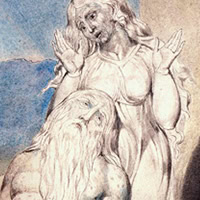Divine Justice and Human Creativity in Jewish Literature
In the biblical Book of Job, Job’s challenge to God—“Why do people suffer undeservedly?”—is oddly answered with God’s challenge to Job: “Why aren’t you as creative as I am?” Led by novelist and scholar Dara Horn, this advanced institute will address these twinned questions—the dilemma of divine justice and the related dilemma of human limits—through the lens of both ancient and modern Jewish literature.

Our literary inquiry is designed to complement the philosophic studies of theodicy and the problem of evil. Literature offers a new way of exploring these questions—not because of some magical quality of art, but because plot, character, style and other basic elements of narrative are created on a foundation of assumptions about how the world should or could be. The role of belief and commitment in literature is essential to its power.
“Divine Justice and Human Creativity in Jewish Literature” will introduce students to aspects of literary theory and history that illuminate the ways in which beliefs motivate artistic choices like genre, style, and plot structure, and then explore the effects of those choices on how writers in different eras addressed these enduring questions. With this foundation, we will study the biblical Book of Job and then a selection of modern works that also address these ultimate questions, including works by Sholem Aleichem, I.B. Singer, S.Y. Agnon, Saul Bellow and others.
